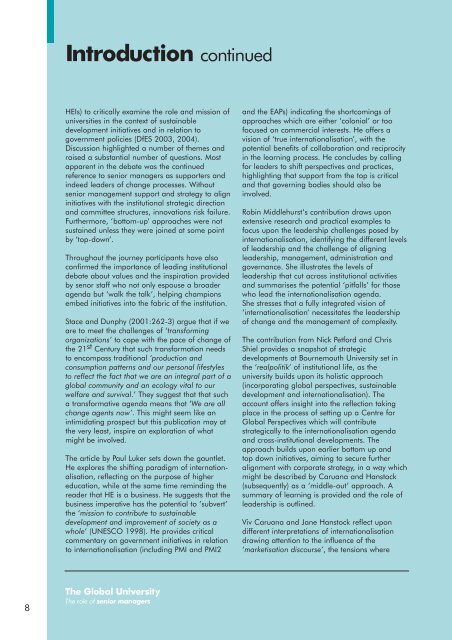HE senior mgrs_Apr18 - Bournemouth University
HE senior mgrs_Apr18 - Bournemouth University
HE senior mgrs_Apr18 - Bournemouth University
Create successful ePaper yourself
Turn your PDF publications into a flip-book with our unique Google optimized e-Paper software.
Introduction continued<strong>HE</strong>Is) to critically examine the role and mission ofuniversities in the context of sustainabledevelopment initiatives and in relation togovernment policies (DfES 2003, 2004).Discussion highlighted a number of themes andraised a substantial number of questions. Mostapparent in the debate was the continuedreference to <strong>senior</strong> managers as supporters andindeed leaders of change processes. Without<strong>senior</strong> management support and strategy to aligninitiatives with the institutional strategic directionand committee structures, innovations risk failure.Furthermore, ‘bottom-up’ approaches were notsustained unless they were joined at some pointby ‘top-down’.Throughout the journey participants have alsoconfirmed the importance of leading institutionaldebate about values and the inspiration providedby senor staff who not only espouse a broaderagenda but ‘walk the talk’, helping championsembed initiatives into the fabric of the institution.Stace and Dunphy (2001:262-3) argue that if weare to meet the challenges of ‘transformingorganizations’ to cope with the pace of change ofthe 21 st Century that such transformation needsto encompass traditional ‘production andconsumption patterns and our personal lifestylesto reflect the fact that we are an integral part of aglobal community and an ecology vital to ourwelfare and survival.’ They suggest that that sucha transformative agenda means that ‘We are allchange agents now’. This might seem like anintimidating prospect but this publication may atthe very least, inspire an exploration of whatmight be involved.The article by Paul Luker sets down the gauntlet.He explores the shifting paradigm of internationalisation,reflecting on the purpose of highereducation, while at the same time reminding thereader that <strong>HE</strong> is a business. He suggests that thebusiness imperative has the potential to ’subvert’the ‘mission to contribute to sustainabledevelopment and improvement of society as awhole’ (UNESCO 1998). He provides criticalcommentary on government initiatives in relationto internationalisation (including PMI and PMI2and the EAPs) indicating the shortcomings ofapproaches which are either ‘colonial’ or toofocused on commercial interests. He offers avision of ‘true internationalisation’, with thepotential benefits of collaboration and reciprocityin the learning process. He concludes by callingfor leaders to shift perspectives and practices,highlighting that support from the top is criticaland that governing bodies should also beinvolved.Robin Middlehurst’s contribution draws uponextensive research and practical examples tofocus upon the leadership challenges posed byinternationalisation, identifying the different levelsof leadership and the challenge of aligningleadership, management, administration andgovernance. She illustrates the levels ofleadership that cut across institutional activitiesand summarises the potential ‘pitfalls’ for thosewho lead the internationalisation agenda.She stresses that a fully integrated vision of‘internationalisation’ necessitates the leadershipof change and the management of complexity.The contribution from Nick Petford and ChrisShiel provides a snapshot of strategicdevelopments at <strong>Bournemouth</strong> <strong>University</strong> set inthe ‘realpolitik’ of institutional life, as theuniversity builds upon its holistic approach(incorporating global perspectives, sustainabledevelopment and internationalisation). Theaccount offers insight into the reflection takingplace in the process of setting up a Centre forGlobal Perspectives which will contributestrategically to the internationalisation agendaand cross-institutional developments. Theapproach builds upon earlier bottom up andtop down initiatives, aiming to secure furtheralignment with corporate strategy, in a way whichmight be described by Caruana and Hanstock(subsequently) as a ‘middle-out’ approach. Asummary of learning is provided and the role ofleadership is outlined.Viv Caruana and Jane Hanstock reflect upondifferent interpretations of internationalisationdrawing attention to the influence of the‘marketisation discourse’, the tensions where8The Global <strong>University</strong>The role of <strong>senior</strong> managers





![[2012] UKUT 399 (TCC)](https://img.yumpu.com/51352289/1/184x260/2012-ukut-399-tcc.jpg?quality=85)




![Neutral Citation Number: [2009] EWHC 3198 (Ch) Case No: CH ...](https://img.yumpu.com/50120201/1/184x260/neutral-citation-number-2009-ewhc-3198-ch-case-no-ch-.jpg?quality=85)





